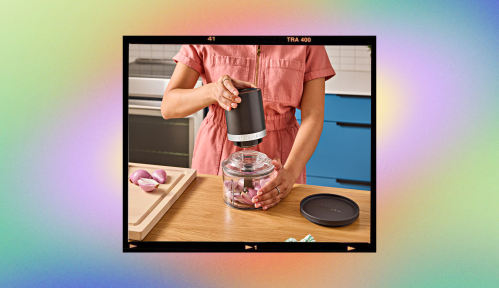Sipping a cup of coffee in the morning can feel like you’re taking a quiet moment for yourself while getting energized for your day. But buzzy new research suggests that a regular coffee habit can help support healthy aging in women, too.
Experts in This Article
adjunct professor in the Department of Nutritional Sciences at University of Toronto
director of the Center for Chronic Disorders of Aging and professor of Neuroscience at Philadelphia College of Osteopathic Medicine
board-certified family medicine physician at Providence Saint John’s Health Center Santa Monica, California
Chief of the Division of Clinical Nutrition at David Geffen School of Medicine at UCLA
registered dietitian and founder of 80 Twenty Nutrition
That’s the major takeaway from this study, which was presented at the annual meeting of the American Society for Nutrition this week. While the study hasn’t been published yet, it’s part of a growing body of research that suggests coffee is more than just a delicious way to start your day. And if you're part of the 75 percent of Americans who drink coffee, you'll be glad to know there are some real health benefits behind your daily cup of joe.1
But there are a few nuances to keep in mind before sprinting to your nearest coffee shop for an extra cup. Here’s exactly what the study found, plus what experts want you to be aware of before loading up on caffeine.
A quick recap of the study
Let's be clear: the study hasn’t yet been peer-reviewed (an important step in research) or published, but the findings are so intriguing that they’re already grabbing plenty of attention.
In this study, researchers analyzed data from more than 47,000 women who participated in the Nurses' Health Study, a longitudinal (aka long-term) study that has been following women since the 1970s. The women answered questions about their diet, including how much coffee and other common beverages they usually drank. The researchers then analyzed that information to determine how many women met the criteria for healthy aging.
What exactly does healthy aging mean in this context? To be considered as a part of the healthy aging group, participants had to be 70 or older, in good physical and mental health, and free of 11 different chronic health conditions, including cancer, type 2 diabetes, and heart disease. (The researchers found that 3,706 women met these criteria.)
After taking a deep dive into the women’s diets, the researchers discovered that women who consumed the most caffeine—the equivalent of nearly seven 8-ounce cups of coffee per day—when they were between 45 and 60 years old, were the most likely to be healthy agers. They specifically had a 13 percent higher likelihood of being a healthy ager compared to those who had a daily caffeine intake of less than one cup a day.
Worth pointing out: The researchers didn’t find a link between tea or decaf coffee and healthy aging, and caffeinated colas were linked with lower odds of healthy aging. “While this was an observational study and cannot prove cause and effect, the association remained significant even after adjusting for key lifestyle and health factors such as diet quality, physical activity, BMI, and smoking,” says Sara Mahdavi, RD, PhD, lead study author and adjunct professor in the Department of Nutritional Sciences at University of Toronto.
Why might coffee support healthy aging?
It's worth noting that this study didn’t look at why coffee is linked to healthy aging—it just found an association. Still, there are some theories. Coffee contains a mix of biologically active compounds, including chlorogenic acids, trigonelline, diterpenes, and melanoidins, along with small amounts of micronutrients like magnesium, potassium, vitamin B3, and manganese, Dr. Mahdavi points out. “These compounds may influence biological processes relevant to aging, including inflammation, vascular function, and glucose metabolism,” she explains.
The way women metabolize coffee may also factor into the overall impact on aging, according to Dr. Mahdavi. “In women, caffeine is primarily metabolized by the liver enzyme CYP1A2, which can be modulated by hormonal status,” she says. “Estrogen is known to slow caffeine metabolism, particularly during midlife hormonal transitions such as perimenopause or when using hormone therapy. This could influence how long caffeine remains active in the system.” But, she adds, it’s not entirely clear what impact this has on health.
However, coffee is a rich source of antioxidants, which can offer its own benefits. "Coffee is also a major contributor to antioxidants in our diet," says Brian J. Balin, PhD, director of the Center for Chronic Disorders of Aging and professor of Neuroscience at Philadelphia College of Osteopathic Medicine. "As an antioxidant, there are benefits to brain health, heart health, blood pressure, and prevention of type 2 diabetes and stroke."
All that said, there’s still some mystery surrounding why coffee may support longevity, says David Cutler, MD, a family medicine physician at Providence Saint John’s Health Center in Santa Monica, CA. “Coffee is a very complex substance,” he says. “If there is a significant benefit, it’s difficult to identify what chemical or compounds might be contributing.”
What type of coffee is best?
This particular study just looked at how much caffeine women got from coffee, not how each cup was prepared or whether things like creamer or sugar were added, Dr. Mahdavi notes.
But research generally suggests that black coffee is best, says Zhaoping Li, MD, PhD, chief of the Division of Clinical Nutrition at David Geffen School of Medicine at UCLA. “The benefit is much more obvious if you drink black coffee—not consuming sugar and fats with it,” she says.
One study published last month of more than 46,000 Americans found that people who had one to three cups of coffee a day were about 15 percent less likely to die over the study period (nine to 11 years) than people who didn’t drink coffee.2 But people who had more than 1/2 teaspoon of sugar in their coffee or more than one gram of saturated fat from things like milk or creamer did experience that same longevity perk.
“Most of the evidence linking coffee to health benefits comes from studies of black or minimally sweetened coffee,” Dr. Mahdavi says. “While small amounts of milk or sugar are unlikely to negate these benefits, high levels of added sugar or saturated fat—from whipped cream or flavored syrups—could diminish them over time.”
Okay, but seven cups of coffee a day?
Let's rewind: the study explained that women consumed enough caffeine to the equivalent of seven cups a day. Now, seven cups of coffee a day is *a lot*, and it far exceeds the Food and Drug Administration’s recommended daily caffeine ceiling of 400 milligrams. Most research around coffee’s health benefits focuses on amounts that are much lower than seven cups, Dr. Li points out.
“The overall health benefits of coffee seem to be right around three cups,” Dr. Li says. (While every cup of coffee will have different levels of caffeine depending on the beans used and strength of the brew, she points out that each cup tends to offer about 100 milligrams of caffeine.) “That’s a safe range,” Dr. Li says. “I do not want you to load yourself up with 700 milligrams of caffeine. That is concerning.”
But Dr. Mahdavi says the seven cups of coffee figure has been misinterpreted. “In the study, intake was calculated using a standardized unit of 80 milligrams of caffeine per cup, which is smaller than a typical U.S. serving,” she says. “Some women in the highest category of intake reached that threshold, but the strongest associations with healthy aging were observed at moderate intake—about two to four cups per day.”
Dr. Mahdavi also says that her research shouldn’t provide advice on how much coffee to drink. “The way people metabolize caffeine varies widely between individuals due to genetic and hormonal differences,” she says, adding that this can have a big influence on how much coffee you drink and how it impacts your health. So, if you love your morning cup of coffee and want to know if you can change how much you consume, your best bet is to check in with your primary care provider or a registered dietitian who can provide you with individualized recommendations.
Coffee still shouldn’t be considered a magic bullet for healthy aging
While the findings are interesting—and can make you feel good when you’re enjoying your daily cup—experts agree that drinking coffee alone isn’t the secret to longevity.
“The contribution of coffee is modest compared to other lifestyle factors,” Dr. Mahdavi says. “In our cohort, women who had a higher-quality diet, did not smoke, and exercised regularly had significantly better aging outcomes and longer life expectancy. These behaviors are orders of magnitude more important and absolutely irreplaceable.”
Dr. Li agrees, noting that being active and eating a varied diet that’s low in ultra-processed foods are more important for overall health. “This is part of the whole movement focused on natural food,” she says. “It is the way to go for overall better health and healthy aging.”
If longevity is a priority, Dr. Cutler recommends taking an honest look at your lifestyle habits, too—not just your caffeine consumption. “There’s a common myth that if I do something good, it can outweigh something bad I’m doing—if I have a vegetable today, it can outweigh the cigarette I had yesterday,” he says. “But that kind of mentality doesn’t help healthy aging.”
And our expert dietitian shares the same sentiment. "Drinking coffee won't cancel out being inactive or not eating well," says Christy Brissette, RD, a dietitian and the owner of 80 Twenty Nutrition. "Those are foundational for longevity, along with sleep and maintaining your social, emotional, and cognitive wellbeing. Coffee is a small piece of the big picture of what healthy aging can look like."
But if you don’t already have a coffee habit, Dr. Mahdavi says there’s no reason to start now. “We are not recommending that people begin drinking coffee solely for longevity, especially if they do not tolerate caffeine or have health conditions that limit intake,” she says. “For people who already follow best practices—eating well, being active, not smoking—coffee may offer an additional benefit. But it’s an enhancement, not a substitute.”
- Loftfield, Erikka, et al. “Coffee Drinking Is Widespread in the United States, but Usual Intake Varies by Key Demographic and Lifestyle Factors.” Journal of Nutrition, vol. 146, no. 9, Aug. 2016, pp. 1762–68. https://doi.org/10.3945/jn.116.233940. ↩︎
- Zhou, Bingjie, et al. “Coffee Consumption and Mortality Among U.S. Adults: A Prospective Cohort Study.” Journal of Nutrition, May 2025, https://doi.org/10.1016/j.tjnut.2025.05.004. ↩︎
Sign Up for Our Daily Newsletter
Get all the latest in wellness, trends, food, fitness, beauty, and more delivered right to your inbox.
Got it, you've been added to our email list.





